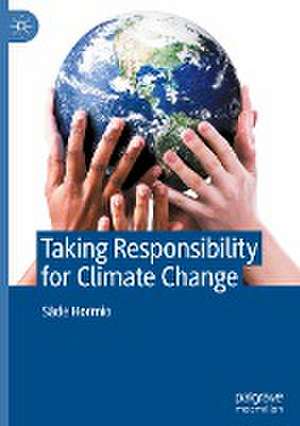Taking Responsibility for Climate Change
Autor Säde Hormioen Limba Engleză Hardback – 21 feb 2024
The focus of the book is on areas of climate change responsibility that are often left out of the picture or get too little attention in climate ethics, such as carbon inequality within countries. But why should any theoretical arguments about normative issues matter when we have a real-life climate crisis on our hands? Säde Hormio argues that ethical arguments have an important role in setting climate policy: they can highlight what values are at stake and help ground normative arguments in public deliberations.
Preț: 694.37 lei
Preț vechi: 816.90 lei
-15% Nou
Puncte Express: 1042
Preț estimativ în valută:
132.88€ • 137.89$ • 111.07£
132.88€ • 137.89$ • 111.07£
Carte tipărită la comandă
Livrare economică 17-31 martie
Preluare comenzi: 021 569.72.76
Specificații
ISBN-13: 9783031517525
ISBN-10: 3031517520
Pagini: 150
Ilustrații: XIII, 150 p.
Dimensiuni: 148 x 210 mm
Greutate: 0.35 kg
Ediția:2024
Editura: Springer International Publishing
Colecția Palgrave Macmillan
Locul publicării:Cham, Switzerland
ISBN-10: 3031517520
Pagini: 150
Ilustrații: XIII, 150 p.
Dimensiuni: 148 x 210 mm
Greutate: 0.35 kg
Ediția:2024
Editura: Springer International Publishing
Colecția Palgrave Macmillan
Locul publicării:Cham, Switzerland
Cuprins
1. Introduction to collective and shared responsibility for climate change.- 2. Calling all collective agents.- 3. Responsibility as members.- 4. Shared social orientation and responsibility as constituents.- 5. Carbon inequality and direct responsibility.- 6.Why we need ethical arguments to set good climate policies.
Notă biografică
Säde Hormio is an Academy Research Fellow in Practical Philosophy at the University of Helsinki. She is also affiliated with the Institute for Futures Studies in Stockholm. Her research focuses on shared and collective responsibility.
Textul de pe ultima copertă
"In this innovative book, Hormio effectively argues for an 'all hands on deck' approach to assigning climate change responsibility to a wider array of agents than is typically recognized, making the case that ethical analysis matters for complex policy problems like climate change.”
—Steve Vanderheiden, Professor of Political Science, University of Colorado at Boulder, USA "By interweaving philosophical argument with real-world examples, Säde Hormio makes an important contribution to debates about collective responsibility for climate change."
—Stephanie Collins, Associate Professor of Philosophy, Monash University, Australia
This book proposes that it is not only states and international bodies that have a responsibility to take action toward mitigating climate change. Other collective agents, such as corporations, need to also come onboard. Additionally, the book argues that climate change is not solely a problem for collective agents, but also for individuals, as they are members of collectives and groups of several kinds. Therefore, framing climate change responsibility exclusively from either the collective or the individual perspective leaves out something crucial: how we all are influenced by the collectives we belong to and how, in turn, collectives are influenced by individuals.
The focus of the book is on areas of climate change responsibility that are often left out of the picture or get too little attention in climate ethics, such as carbon inequality within countries. But why should any theoretical arguments about normative issues matter when we have a real-life climate crisis on our hands? Säde Hormio argues that ethical arguments have an important role in setting climate policy: they can highlight what values are at stake and help ground normative arguments in public deliberations.
Säde Hormio is an Academy Research Fellow in Practical Philosophy at the University of Helsinki. She is also affiliated with the Institute for Futures Studies in Stockholm. Her research focuses on shared and collective responsibility.
—Steve Vanderheiden, Professor of Political Science, University of Colorado at Boulder, USA "By interweaving philosophical argument with real-world examples, Säde Hormio makes an important contribution to debates about collective responsibility for climate change."
—Stephanie Collins, Associate Professor of Philosophy, Monash University, Australia
This book proposes that it is not only states and international bodies that have a responsibility to take action toward mitigating climate change. Other collective agents, such as corporations, need to also come onboard. Additionally, the book argues that climate change is not solely a problem for collective agents, but also for individuals, as they are members of collectives and groups of several kinds. Therefore, framing climate change responsibility exclusively from either the collective or the individual perspective leaves out something crucial: how we all are influenced by the collectives we belong to and how, in turn, collectives are influenced by individuals.
The focus of the book is on areas of climate change responsibility that are often left out of the picture or get too little attention in climate ethics, such as carbon inequality within countries. But why should any theoretical arguments about normative issues matter when we have a real-life climate crisis on our hands? Säde Hormio argues that ethical arguments have an important role in setting climate policy: they can highlight what values are at stake and help ground normative arguments in public deliberations.
Säde Hormio is an Academy Research Fellow in Practical Philosophy at the University of Helsinki. She is also affiliated with the Institute for Futures Studies in Stockholm. Her research focuses on shared and collective responsibility.
Caracteristici
Combines debates on individual and collective responsibility for climate change harms Takes into account real-life concerns and utilizes case studies throughout Blends questions from social ontology, moral philosophy, and political philosophy into a coherent narrative
